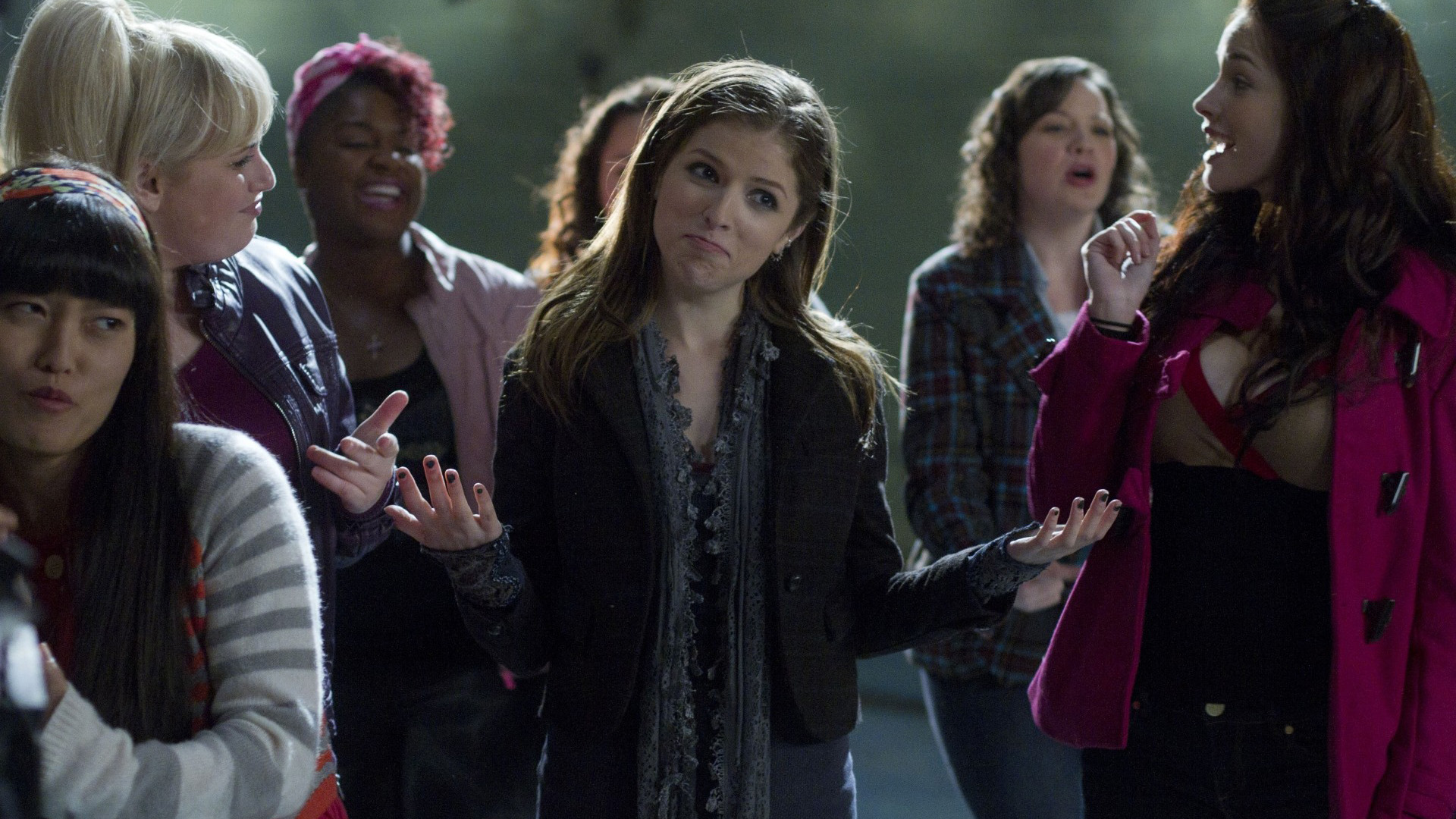The Deltones. The Sig O’s. Purple Haze. These are some of the a cappella groups at my Alma Mater. Like Pitch Perfect shows the audience, the “battles” between a cappella groups can become intense affairs like any other sport. What makes Pitch Perfect a strong entry into the “sports movie” genre is the affection it has for the sport itself. Pitch Perfect’s singers may not harmonize like the Beatles, but they leave a pleasing note for the viewer.
Beca (Anna Kendrick), Barden College’s newest mash-up-ologist, gets onto campus with the intent of jetting off to LA as soon as possible to make music. Forced to go to school by her dad, she at least keeps her passion relevant by joining two activities. One is interning for the local radio station where she tries to get her mixes on the air and meets Jesse (Skylar Astin). The other club is the Barden Bellas, an all female a cappella group led by Aubrey (Anna Camp) and Chloe (Brittany Snow). Joined by other new recruits Fat Amy (not an insult, actually her name Rebel Wilson), sultry Stacie (Alexis Knapp) and inaudible Lilly (Hana Mae Lee), the Barden Bellas hope to win the Collegiate A Cappella finals (an actual event) against their all male rivals the Trebelmakers, where Jesse, coincidentally, just got invited to join.
Despite a movie about singers with no instrumental accompaniment, Pitch Perfect plays the movie completely straight. By not even showing any college classes, Pitch Perfect lets the audience dive right in to the preparation and execution of an a cappella performance. Though this pigeon-holed viewpoint, the audience gets a chance to connect to every character. Even the type A personality Aubrey gets a moment of redemption. This affection pays the most dividends with Jesse, who gets to be a musical rival but ends up being a pretty nice and cool guy, especially to his overly nerdy roommate when he would be so easily forgotten. Not every character in Pitch Perfect can be described as dimensional, but every character serves a function in the world they inhabit, thus making them necessary pieces.
The musical sequences represent the highlight of Pitch Perfect. The success of the performances looks like a Bell curve, with most of the great stuff in the middle and the weaker numbers at the beginning and end (it is fun, but the Bella’s song is unmoving). The spontaneous numbers are the highlight: 1 involving a sing off between the groups, and 1 involving a sing-a-long on a bus. Those numbers work the best because of what appears to the actors being allowed to mess around a little and create something special. The climax isn’t all bad; the Trebelmakers do something really sweet that isn’t too clear, but Pitch Perfect misses the opportunity for the groups to join forces against another enemy in the finals, and instead resorts to clichés.
Acting in Pitch Perfect is more of a test of likability than complexity. On that note, Anna Kendrick could not be more winning as Beca. Even through the little attempts to make her sound rebellious, her adorable likability shines through. Skylar Astin doesn’t quite match Kendrick’s charisma, but he gets pretty close: not an easy feat. Brittany Snow abandons her scream queen persona to make Chloe a really compelling character as she is torn between Beca and Aubrey but remains friends with both of them. Rebel Wilson and Hana Mae Lee have fun with their roles. Anna Camp’s part is written too scathing to be fully redeemed by her transformation, which Camp doesn’t sell too well.
Pitch Perfect makes the audiences cheer for a cappella performers in a singing competition, not an easy task. It distinguishes itself enough from the Voice, American Idol, and Glee to stand on its own because of its winning leads and fun performances. One of my friends called Pitch Perfect a “game changer.” I don’t think it quiet gets to that level, but like the Breakfast Club song, it politely asks “Don’t you forget about me.” I won’t. It’s good enough to not be forgotten easily.

